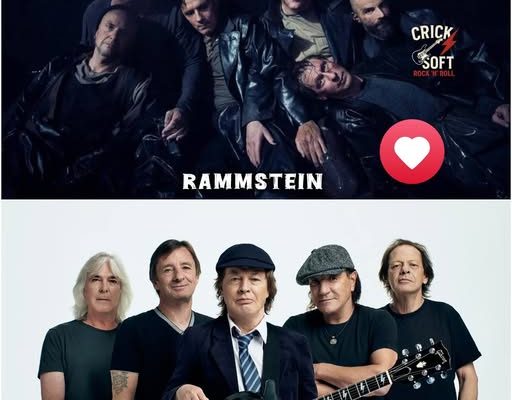Rammstein vs. AC/DC is a debate that instantly sparks fire among fans of hard rock and heavy metal. Both bands are not only icons of their respective countries—Germany and Australia—but also global giants who redefined the meaning of explosive live performances, uncompromising sound, and cultural impact. Yet when the question is asked of which band edges out the other, the case for Rammstein becomes more compelling in today’s musical landscape. AC/DC, without question, is a legendary act whose riffs, rhythms, and rebel swagger set the blueprint for hard rock’s mainstream success. But Rammstein, the German titans of industrial metal, have taken the formula further—blending music, theater, spectacle, and controversy into a living, breathing art form that consistently keeps them ahead of the curve. Comparing the two reveals that while AC/DC remain eternal pioneers, Rammstein surpass them in sheer innovation, live performance scale, and continued relevance.
The heart of the debate begins with sound. AC/DC’s music is built on simplicity—straightforward riffs, bluesy grooves, and Angus Young’s guitar genius combined with Bon Scott’s rebellious edge and Brian Johnson’s raw energy. Their catalog is timeless because it thrives on an unshakable formula: power chords, driving rhythms, and high-voltage delivery. But for all its consistency, AC/DC’s sound has often been criticized for its lack of evolution. A new AC/DC album, while exciting, often feels like a continuation of the same template they perfected decades ago. Rammstein, on the other hand, thrives on pushing boundaries sonically. Their industrial metal foundation mixes pounding riffs with electronic textures, synthesizers, orchestral arrangements, and experimental structures. From the raw ferocity of Herzeleid to the haunting drama of Mutter and the dark theatricality of Sehnsucht and Reise, Reise, Rammstein has consistently expanded their sonic palette without abandoning their core heaviness. Each album feels distinct while still unmistakably theirs, proving that they are masters of evolution within their genre.
Lyrics also demonstrate a stark difference in depth and impact. AC/DC lyrics are iconic but largely one-dimensional. Their catalog celebrates rebellion, rock ’n’ roll excess, partying, and sex. Songs like “Highway to Hell,” “Back in Black,” and “You Shook Me All Night Long” are eternal anthems of rock culture, but they lack the poetic darkness and complexity that Rammstein brings. Rammstein’s lyrics, written primarily in German, explore taboo subjects, political themes, love, violence, and the human condition with a boldness that most mainstream acts avoid. Songs like “Mein Teil,” inspired by the infamous German cannibal case, or “Deutschland,” which wrestles with Germany’s turbulent history, showcase a level of social and cultural engagement that elevates their work beyond simple entertainment. Their choice to sing primarily in German, instead of switching to English to appeal to a global audience, reflects both authenticity and confidence. Despite language barriers, their words resonate worldwide because of the power of delivery and emotional intensity. AC/DC’s lyrics may unite stadiums in chant, but Rammstein’s provoke thought, conversation, and sometimes controversy, granting their work a deeper layer of artistic value.
When it comes to live performances, the comparison is no contest. AC/DC are known for their raw energy on stage, with Angus Young’s schoolboy outfit and frantic solos serving as their trademark. Their shows are a celebration of rock tradition, full of energy and crowd interaction. However, Rammstein has redefined what it means to perform live in the modern era. Their concerts are not merely shows but full-scale theatrical productions. Pyrotechnics, flamethrowers, elaborate stage sets, and shocking visuals are not side notes but integral to the performance. Every song becomes a dramatic scene, whether it’s Till Lindemann wielding a flamethrower during “Rammstein,” cooking his bandmate in a giant cauldron during “Mein Teil,” or riding a giant foam cannon into the audience during “Pussy.” Rammstein elevates their music with visuals that embed themselves in the minds of fans long after the concert ends. They treat live performance as performance art, blurring the lines between theater and rock concert in a way AC/DC never attempted. This theatrical dominance gives Rammstein a distinct advantage in capturing modern audiences who crave immersive experiences.
Commercially, AC/DC has an undeniable legacy. Their albums Back in Black and Highway to Hell are among the best-selling records in history, and their songs are staples of classic rock radio worldwide. They are part of rock’s DNA, with multi-generational appeal that few bands can match. Rammstein, however, has achieved something equally impressive in a completely different era. Despite singing in German, they have headlined festivals across the world, sold out stadiums from Mexico City to Moscow, and built a fiercely loyal international fanbase. Their albums consistently chart at the top globally, and their influence spreads across genres from metal to electronic to pop. For a band from a non-English-speaking country to achieve such dominance in the Anglo-American-dominated music industry is a remarkable feat. It shows not only their musical power but also the universal resonance of their art.
Another factor is cultural relevance. AC/DC’s golden years belong to the late 1970s and 1980s, an era when they defined what it meant to be a rebellious rock band. They are now seen more as icons of rock history than as a current driving force. Their music endures, but new generations often engage with AC/DC through their parents’ playlists rather than as a band leading the charge today. Rammstein, by contrast, remains explosively relevant. They release new albums that generate global headlines, their tours continue to set attendance records, and their music videos push artistic and cultural boundaries in the digital age. The 2019 release of “Deutschland,” with its provocative visuals addressing Germany’s troubled past, sparked worldwide debate and reminded everyone that Rammstein is not just entertainment but cultural commentary. Their ability to remain controversial, topical, and artistically daring in the 21st century gives them an edge in relevance that AC/DC no longer holds.
Innovation is another area where Rammstein surpasses AC/DC. AC/DC is beloved for never changing, but that consistency can also be viewed as creative stagnation. Rammstein, meanwhile, embraces reinvention in subtle but significant ways—musically, visually, and theatrically. Their albums often feel like chapters in an evolving story rather than repeated blueprints. The visual artistry in their music videos alone has set standards that few rock or metal bands can match. Each video is cinematic, filled with symbolism and provocation, turning songs into cultural events. Whether it’s the surreal imagery of “Sonne,” the outrageous humor of “Pussy,” or the shocking commentary of “Deutschland,” their videos transcend the typical band aesthetic and become works of art in themselves.
The subject of endurance also plays into the debate. AC/DC has weathered decades of lineup changes, including the tragic loss of Bon Scott and the health struggles of Malcolm Young, yet they continue to tour and record. Their resilience is admirable and adds to their legendary status. Rammstein, however, has managed to keep its original lineup intact for over three decades, a rare feat in the world of rock and metal. That stability not only strengthens their chemistry but also preserves the authenticity of their identity. Fans know that when they see Rammstein, they are witnessing the same group of artists who built the band from the ground up, without dilution or compromise.
It’s also worth considering how each band has influenced others. AC/DC’s imprint on hard rock is unquestionable. Countless bands have borrowed from their riffs, attitude, and stage energy. Without AC/DC, much of modern hard rock would not exist. Yet Rammstein’s influence is broader than it might appear at first glance. They helped popularize industrial metal on a mainstream level, paving the way for countless bands to experiment with the fusion of heavy guitars and electronic elements. They also opened doors for non-English-speaking bands to break into global markets. Their success challenges the dominance of Anglo-American acts and proves that music can transcend linguistic and cultural barriers.
In the end, the comparison comes down to timelessness versus evolution. AC/DC is timeless, a band whose songs will forever define the spirit of rock and roll. They are monuments of rock history. Rammstein, however, represents evolution—a band that continues to adapt, provoke, and expand the boundaries of what a rock band can be in the modern era. They are not just keeping up with the times but shaping them, ensuring their relevance not just in nostalgia but in contemporary culture.
To edge out a band as monumental as AC/DC is no small feat, yet Rammstein does so by excelling in areas where AC/DC has remained static. Their daring artistic vision, groundbreaking live performances, willingness to confront taboo subjects, and ability to maintain cultural relevance in the digital age give them the edge. AC/DC will always be legends, immortalized in the pantheon of rock. But Rammstein stands as the modern titan—a band that doesn’t just entertain but challenges, provokes, and evolves. They are proof that rock and metal are not relics of the past but living, breathing forces capable of captivating new generations. That is why, in a head-to-head comparison, the German industrial juggernaut edges out the Australian legends, not by erasing their greatness, but by pushing the genre into the future while still commanding the present.


